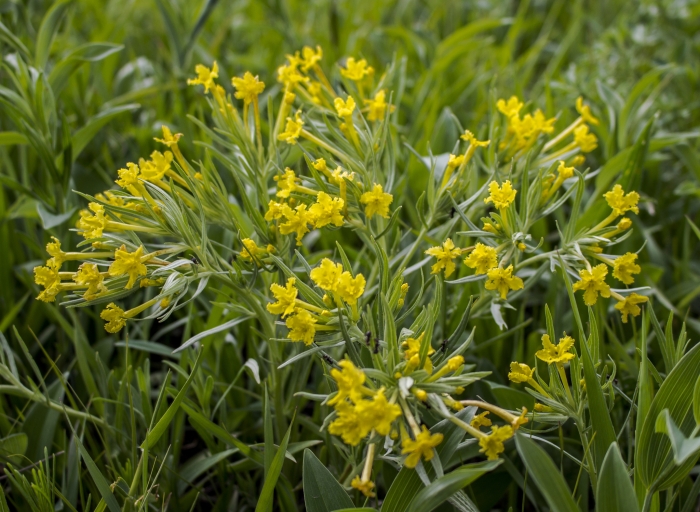Narrowleaf Stoneseed
(Lithospermum incisum)
Narrowleaf Stoneseed (Lithospermum incisum)
/
/

aarongunnar
CC BY 4.0
Image By:
aarongunnar
Recorded By:
Copyright:
CC BY 4.0
Copyright Notice:
Photo by: aarongunnar | License Type: CC BY 4.0 | License URL: http://creativecommons.org/licenses/by/4.0/ | Rights Holder: aarongunnar | Publisher: iNaturalist | Date Created: 2017-05-18T15:58:08-07:00 |




















































Estimated Native Range
Summary
Lithospermum incisum, commonly known as Narrowleaf Stoneseed, is a deciduous perennial herb that is native to a variety of habitats including prairies, open woodlands, and grasslands in the Central United States and Southwestern Canada. It typically grows from a taproot and woody caudex, reaching up to 30 centimeters in height. The plant produces multiple stems lined with narrow, pointed leaves that can be up to 6 centimeters long. From late spring to early summer, Narrowleaf Stoneseed bears slender, trumpet-shaped flowers that range in color from pale to bright yellow or gold, with a corolla face 1 to 2 centimeters wide and lobes that are sometimes ruffled. The flowers are particularly notable for their size, which may approach 4 centimeters long. Additionally, it produces smaller cleistogamous (closed) flowers that are the main producers of seed.
This species is valued for its drought tolerance and bright yellow flowers, which can add a splash of color to rock gardens, native plantings, and xeriscapes. It is often used in restoration projects due to its adaptability and ability to thrive in poor soils. In cultivation, Narrowleaf Stoneseed does best in full sun, with low to medium water requirements, and prefers well-drained soils. While it is not commonly afflicted by serious pests or diseases, it can be sensitive to overwatering and poor drainage.CC BY-SA 4.0
This species is valued for its drought tolerance and bright yellow flowers, which can add a splash of color to rock gardens, native plantings, and xeriscapes. It is often used in restoration projects due to its adaptability and ability to thrive in poor soils. In cultivation, Narrowleaf Stoneseed does best in full sun, with low to medium water requirements, and prefers well-drained soils. While it is not commonly afflicted by serious pests or diseases, it can be sensitive to overwatering and poor drainage.CC BY-SA 4.0
Plant Description
- Plant Type: Herb
- Height: 0.3-1.3 feet
- Width: 0.231-1 feet
- Growth Rate: Moderate
- Flower Color: Yellow
- Flowering Season: Spring, Summer
- Leaf Retention: Deciduous
Growth Requirements
- Sun: Full Sun
- Water: Low, Medium
- Drainage: Fast
Common Uses
Bee Garden, Butterfly Garden, Groundcover, Low Maintenance
Natural Habitat
Native to prairies, open woodlands, and grasslands
Other Names
Common Names: Fringed Gromwell , Fringed Puccoon , Plains Stoneseed , Incised Puccoon , Narrow-Leaved Gromwell , Narrow-Leaved Puccoon , Narrow-Leaved Stoneseed , Yellow Gromwell , Grémil Incisé
Scientific Names: Lithospermum incisum , Lithospermum angustifolium , Lithospermum linearifolium , Lithospermum albicans , Lithospermum mandanense , Lithospermum breviflorum , Lithospermum longiflorum , Lithospermum oblongum , Lithospermum asperum , Pentalophus longiflorus
GBIF Accepted Name: Lithospermum incisum Lehm.